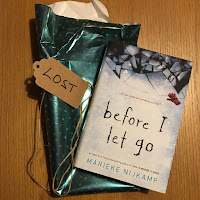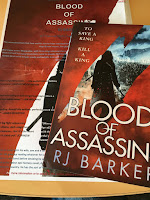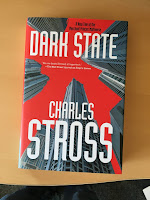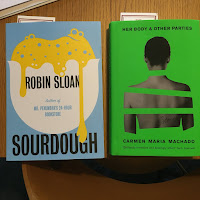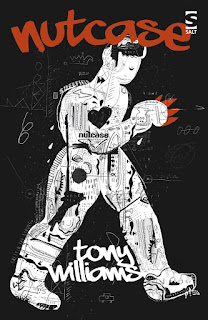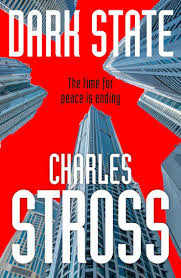 |
| Cover by Dave McKean |
Mad Hatters and March Hares: All-New Stories from the World of Lewis Carroll's Alice in Wonderland
Edited by Ellen Datlow
Tor, 12 December 2017
PB, 332pp
I'm grateful to the publisher for an advance e-copy of this book via NetGalley.
The playground that is Lewis Carroll's Wonderland begs to be peopled by authors, filmmakers, comic makers, indeed anyone with a creative spark who can produce a fresh take on the adventures of Alice and the surreal, sinister crew that she encountered down the rabbit hole and through the looking glass.
And so we have in this book an abundance: dark Wonderlands, Wonderlands turned into theme parks or battle fields, imaginary Wonderlands, Wonderlands that have spilled over into the "real world". We have White Rabbits (literal and metaphorical), Red and White Queens, Cheshire Cats (and other Cheshires), Jabberwockies, wabes and much, much more.
Above all, we have Alices. Alices of all sorts: little girls who fell down that rabbit hole, older women who came out, the real Alice Liddell, missing daughters, wayward Alices, tough cookie Alices. Alices as victims, as manipulators, as surrogates, as avengers.
All read at once, it is perhaps rather overwhelming, like eating a whole box of Christmas chocs in one go, and I wouldn't advise that (apart from anything else, many if not all of the stories evoke - mostly with some success - the jargon and atmosphere of Carroll's books and that is something which is perhaps best not taken in large doses). No, I'd suggest rather that you come and go: read a story, ponder, return. Hop around the book, depending whether you want pastiche Alice, Alice-with-a-twist or - and these were my favourites - Alice inspired fiction, perhaps with no Wonderland, indeed even no Alice as such, but with a sense of
something.
As you fall down that rabbit hole, passing shelves and volumes, I offer the following as a brief guide, to help you choose what to read and in what order.
My Own Invention (Delia Sherman) - An Alice meets the Red Knight in a wood. Or is she a not-Alice? In Wonderland you can never be sure.
Lily-White and Thief of Lesser Night (CSE Cooney) is a beguiling piece of fantasy, clearly set in a Wonderland but not, for once, featuring an Alice. It's a nice story of fantasy and adventure set among the vorpal roses.
Conjoined (Jane Yolen - some of whose Alice stories were included in her
The Emerald Circus which I recently reviewed, although not those featured here) is a story of the Tweedle twins touring with Barnum's circus.
Mercury (Priya Sharma) is a dark tale set in a debtors' prison not so far from the village of Daresbury where the real CL Dodgson is commemorated in church window. It features a hatter and his daughter and the mercury that causes hatters' madness. The ensemble of Wonderland turn up in wonderfully distorted ways - a Duchess who is the boss of the jail. An Alice who's taught "Be tiny. be giant. Adapt to the dictates of the situation". A cat called Dinah. A Knave... Here, it's all about escape.
Some Kind of Wonderland (Richard Bowes) reimagines the Alice stories as a film made in 1960s New York, which is revisited by its stars, now advanced in age. Again, the Wonderland motif bleeds through into mundane reality raising possibilities of escape but also of entrapment in that beguiling pocket universe.
Alis (Stephen Graham Jones) is towards the horrific end of the whimsy-horror spectrum that these stories define, taking a familiar trope - foolish students experimenting with things that should be left alone - and giving it a distinctly Carollian twist involving a mirror. "Inspired by" rather than "interpretation of", I think, but nevertheless a fine and chilling story.
All the King's Men (Jeffrey Ford) is one of the odder stories here. Again it features motifs from Carroll's books, but is not quite set in either Wonderland or in any real world. It is more a nursery rhyme kingdom, complete with an evil Humpty Dumpty. It's an inventive, twisty tale, hauntingly effective, portraying a world which could surely feature in a longer piece of fiction.
Run, Rabbit (Angela Slatter) is firmly set in the (a) real world but in a seamy, noirish version of it. The Rabbit (something of a dandy) is on the run from the Queen, and he's late. Then he encounters a girl in a bar. Her name is Pleasance and she works in a garden, with roses. Rabbit works in import-export: don't ask in what he traffics or for whom. A truly seamy, shudder-inducing take on that original encounter between innocent Alice and the distracted Rabbit.
In Memory of a Summer’s Day (Matthew Kressel) is another rather twisted story, its embittered narrator working as guide ("I've been leading tours of Wonderland for forty years...") in a tawdry version of Wonderland that's now run as a theme park. It's still not a safe place, though, as some of the visitors - and our narrator - discover. Memorable for the collision between the essential Wonderland magic, the sheer sinisterness of the reality behind that, and the hustle of the carnival, this one will stay in your mind a long time.
Sentence Like a Saturday (Seanan McGuire) points out that "doors swing both ways" as do stories and then rather brilliantly inverts the logic (or illogic) of Wonderland to ask what happens if somebody - or something - comes
up the rabbit hole? A rather tender story, in point of fact, this contains multitudes and shows how strange our world would be - it runs on logic! - to a befuddled Wonderlandian exiled here. And the price they might pay. After all "a mother was the door through which tomorrow passed".
Worrity, Worrity (Andy Duncan) is another that might almost be a classical horror - I was strongly reminded of MR James. It focuses on Sir John Tenniel, illustrator of
Alice, and his problem with wasps. Eerie, chilling and a nice counterpoint to the stories which actually take us to Wonderland.
Eating the Alice Cake (Kaaron Warren) is another horror story (I think!) There's no overt Wonderland here, quite the opposite: but we have an Alice, who has a consuming passion for food and a painful secret, we meet a Mock Turtle... and there are some familiar names and a mirror. It is a grim little story, slightly nasty in the manner of the best horror.
The Queen of Hats (Ysabeau Wilce) is a little different from the other stories here in that it takes the Alice mythology and transposes it into a new cultural setting: it's about a "poor tamale girl", locating the story in South America but also evoking a meta fictional world which might contain "Ticonderoga, Arkham, Cibola, Porkopolis, Beleogost, Goblin Town, Eboracum, Sunnydale" as well as that most fictional of locations, "London". These names are found on labels on a theatrical trunk, a trunk that contains many marvels, indeed, wonders... here the Wonderland settings are transposed to disused backdrops as might be found in an old style theatre, complete with wardrobe room and auditions for something called (to avoid bad luck) "The Oxford Play". What might that be?
A Comfort, One Way (Genevieve Valentine) speculates on the very question of the identity of an Alice, seeming to suggest that despite all appearances, Wonderland has its own logic and that this may lead it to consume you...
The Flame After the Candle (Catherynne M Valente), a long story, indeed practically a novella, is very much set in this world, the real world, until it isn't. Again it seems to suggest that to its hero, Olive (not, for once, an Alice) real world events and people foreshadow or parallel another, richer place ("Father Dear had left them for that pale, rabbity little heiress in London"). Olive's story is interspersed with an the story of an encounter between who great literary figures, scarred by their visits - whether real or not, is never quite sure - to Wonderland and Neverland. The two tales complement each other well and there are echoes between them, as there are echoes between Olive's own life and the fantasy behind the mirror. A truly enchanting fairytale with a rather bitter edge to it - my favourite in this volume.
Moon, Memory, and Muchness (Katherine Vaz) is another "real world" story. It invokes the tropes of Wonderland ("Everything screams, Eat Me, Drink Me") to tell a very sad story, set in present-day New York, about a mother's loss ("I turned my back, and the earth swallowed her.") A story about appearances, and hurting, and what comes afterwards. Very moving.
The book closes with
Run, Rabbit, Run (Jane Yolen), a short poem and perhaps a warning that the childish delights of Wonderland will only carry you so far.
If there is a preoccupation that these authors return to time and gain it is perhaps, "afterwards". We see both the effect on the Alices (and others) of that time in Wonderland - a kind of theme of the effect on survivors of what was a very weird experience, whether treated as real or imagined. But we also see the effect on "real" people of their encounter with an author who, literally, wrote them into immortality. How does it change you to have your life defined at an early age like that?
Overall, a very strong collection of stories. Recommended.
 Deep Blue Trouble (Lori Anderson, 2)
Deep Blue Trouble (Lori Anderson, 2)

